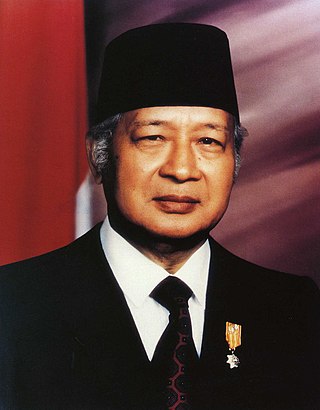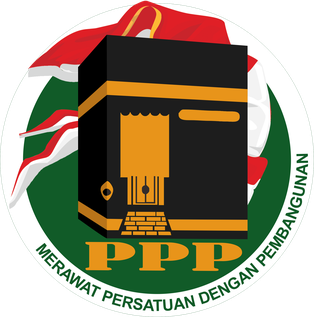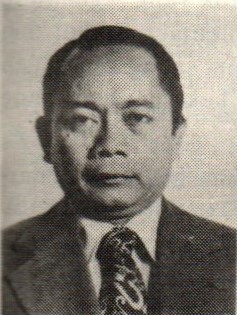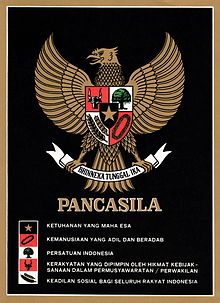
Suharto was an Indonesian army officer and politician, who served as the second and the longest serving president of Indonesia. Widely regarded as a military dictator by international observers, Suharto led Indonesia as an authoritarian regime for 31 years, from the fall of his predecessor Sukarno in 1967 until his own resignation in 1998 following a nationwide unrest. The legacy of his 31-year rule, and his US$ 38 billion net worth, is still debated at home and abroad.

The United Development Party is an Islam-based political party in Indonesia. Due to its distinctive logo, the party is known as the "Kaaba Party".

Abu Bakar Ba'asyir also known as Abu Bakar Bashir, Abdus Somad, and Ustad Abu is an Indonesian Muslim cleric and leader of Jamaah Ansharut Tauhid.

Presidential elections were held in Indonesia on 5 April and 20 September 2004. As no candidate won a majority in the first round, a runoff was held, in which Susilo Bambang Yudhoyono defeated Megawati Sukarnoputri and was elected president. They were the first direct presidential elections in the history of Indonesia; prior to a 2002 amendment to the Constitution of Indonesia, both the president and vice president had been elected by the People's Consultative Assembly (MPR).

Nahdlatul Ulama is an Islamic organization in Indonesia. Its membership estimates range from 40 million (2013) to over 95 million (2021), making it the largest Islamic organization in the world. NU also is a charitable body funding schools and hospitals as well as organizing communities to help alleviate poverty.

Islam is the largest religion in Indonesia, with 86.7% of the Indonesian population identifying themselves as Muslim in a 2018 survey. Indonesia is the most populous Muslim-majority country, with approximately 231 million adherents.

Try Sutrisno is an Indonesian politician and retired army general who served as the country's sixth vice president. He held the office from 11 March 1993 to 11 March 1998. Previously, he served as the Commander of the Republic of Indonesia Armed Forces for five years.

The national emblem or coat of arms of Indonesia is called Garuda Pancasila. The main part is the Garuda with a heraldic shield on its chest and a scroll gripped by its legs. The shield's five emblems represent Pancasila, the five principles of Indonesia's national ideology. The Garuda claws gripping a white ribbon scroll inscribed with the national motto Bhinneka Tunggal Ika written in black text, which can be loosely translated as "Unity in Diversity". Garuda Pancasila was designed by Sultan Hamid II from Pontianak, supervised by Sukarno, and was adopted as the national emblem on 11 February 1950.

The New Order is the term coined by the second Indonesian President Suharto to characterise his administration as he came to power in 1966 until his resignation in 1998. Suharto used this term to contrast his presidency with that of his predecessor Sukarno.

Muhammadiyah ; officially Muhammadiyah Society is a major Islamic non-governmental organization in Indonesia. The organization was founded in 1912 by Ahmad Dahlan in the city of Yogyakarta as a reformist socioreligious movement, advocating ijtihad - individual interpretation of Qur'an and Sunnah, as opposed to Taqlid - conformity to the traditional interpretations propounded by the ulama. Since its establishment, Muhammadiyah has adopted a reformist platform mixing religious and secular education, primarily as a way to promote the upward mobility of Muslims toward a 'modern' community and to purify Indonesian Islam of local syncretic practices. It continues to support local culture and promote religious tolerance in Indonesia, while a few of its higher education institutions are attended mostly by non-Muslims, especially in East Nusa Tenggara and Papua provinces. The group also runs a large chain of charity hospitals, and operated 128 universities as of the late 1990s.

Legislative elections were held in Indonesia on 3 July 1971, the first under the New Order regime. There were ten participants; nine political parties and the "functional group" Golkar, which came first with more than 60 percent of the vote, resulting in an absolute majority in the People's Representative Council.

Khofifah Indar Parawansa is an Indonesian politician who is the current Governor of East Java. Previously she served as the 27th Minister of Social Affairs. She resigned from the position in January 2018 in order to run in the East Java gubernatorial election.

The Jakarta Charter was a document drawn up by members of the Indonesian Investigating Committee for Preparatory Work for Independence (BPUPK) on 22 June 1945 in Jakarta that later formed the basis of the preamble to the Constitution of Indonesia. The document contained the five principles of the Pancasila ideology, but it also included an obligation for Muslims to abide by Shariah law. This obligation, which was also known as the "Seven Words", was eventually deleted from the enacted constitution after the Indonesian declaration of independence on 18 August 1945. Following the deletion of the "Seven Words" efforts by Islamic parties continued to seek its inclusion, most notably in 1959, when the 1945 constitution was suspended; in 1968, during the Transition to the New Order; and in 2002, following the end of the New Order and the beginning of the Reformasi era.

Joko Widodo's presidential campaign in 2019 is Joko Widodo's second presidential bid, following his first campaign's success in the 2014 presidential election. The campaign aimed for Widodo's re-election, with Islamic cleric Ma'ruf Amin as his running mate in a rematch against Prabowo Subianto.

Jailani "John" Naro, also known as Haji Naro or John Naro was a former prosecutor that became an Indonesian politician.

The Pancasila Ideology Development Agency is a non-ministerial government agency formed by the Indonesian government in 2018 with Presidential Decree No.7/2018. The agency was tasked with the main task of preserving Pancasila, the state ideology, and its ideological development and implementation. It is the revitalisation of Presidential Unit of Pancasila Ideology Development formed in 2017.
Khilafatul Muslimin was a Pan-Islamist mass organization based in Bandar Lampung, Indonesia led by Abdul Qodir Hasan Baraja. Claiming to be a non-violent movement, it advocates for establishment of worldwide caliphate above nations. The organization came into public attention when members of the organization spread pamphlets about the rise of caliphate in Jakarta on early June 2022. As the result, many of its members were arrested and Abdul Qodir Hasan were detained by Indonesian National Police.
Abdul Qodir Hasan Baraja is an Indonesian cleric, and the founder and Caliph of Khilafatul Muslimin. He is a former Darul Islam activist, and Komando Jihad combatant which was active during late 1970s to 1980s.

Pancasila is the official, foundational philosophical theory of Indonesia. The name is made from two words originally derived from Sanskrit: "pañca" ("five") and "śīla".



















